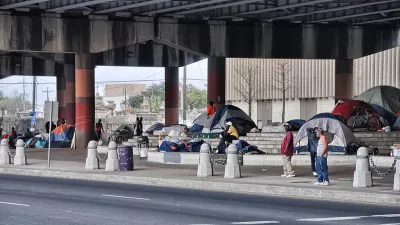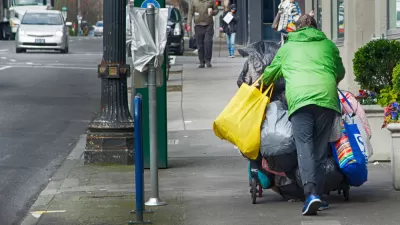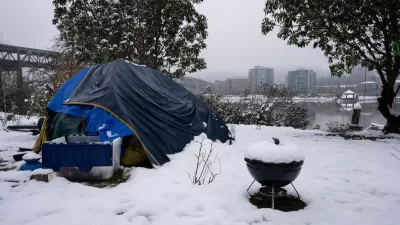An audit describes a number of issues with the city’s program to identify and remove illegal encampments.

The Portland, Oregon, homeless camp clean-up program is falling short in many ways, according to a recently released audit. The One Point of Contact system lets people report illegal campsites, but users say the response is too slow and they do not receive notification about action taken.
The audit also shows that prioritizing campsites, which is supposed to be part of the reporting system, is not happening and that many complaints are not being addressed, reports Gordon R. Friedman. "The week of June 4, 2018, for example, the city received 680 complaints about homeless camps but never followed up on them in 254 cases, auditors concluded."
Homeless people report that they are not given enough notice before clean-ups happen. They say that they do not have time to pack up and move and that belongings are hard to retrieve from the storage warehouse. "The city also did not store valuables such as IDs, credit cards and prescription medications separately from shelves full of blankets, tent parts and other property," writes Friedman.
Auditors found that Portland residents disagree about the clean-up effort, with some feeling that it is harassment and others arguing for even harsher action, such as the arrest of people in illegal campsites. City officials say they will make changes to the program based on the audit’s recommendations.
FULL STORY: Portland homeless camps clean-up program needs improving, auditors say

Maui's Vacation Rental Debate Turns Ugly
Verbal attacks, misinformation campaigns and fistfights plague a high-stakes debate to convert thousands of vacation rentals into long-term housing.

Planetizen Federal Action Tracker
A weekly monitor of how Trump’s orders and actions are impacting planners and planning in America.

In Urban Planning, AI Prompting Could be the New Design Thinking
Creativity has long been key to great urban design. What if we see AI as our new creative partner?

Florida Seniors Face Rising Homelessness Risk
High housing costs are pushing more seniors, many of them on a fixed income, into homelessness.

Massachusetts Budget Helps Close MBTA Budget Gap
The budget signed by Gov. Maura Healey includes $470 million in MBTA funding for the next fiscal year.

Milwaukee Launches Vision Zero Plan
Seven years after the city signed its Complete Streets Policy, the city is doubling down on its efforts to eliminate traffic deaths.
Urban Design for Planners 1: Software Tools
This six-course series explores essential urban design concepts using open source software and equips planners with the tools they need to participate fully in the urban design process.
Planning for Universal Design
Learn the tools for implementing Universal Design in planning regulations.
Gallatin County Department of Planning & Community Development
Heyer Gruel & Associates PA
JM Goldson LLC
City of Camden Redevelopment Agency
City of Astoria
Transportation Research & Education Center (TREC) at Portland State University
Jefferson Parish Government
Camden Redevelopment Agency
City of Claremont





























